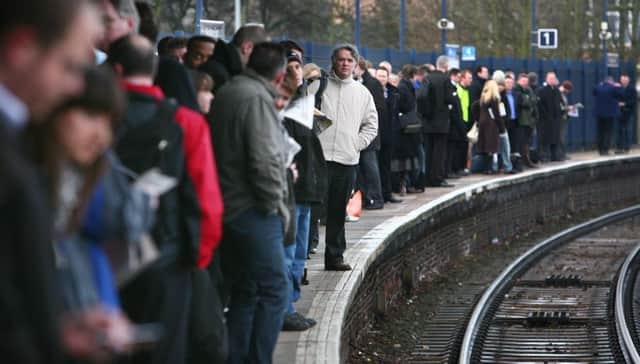Greg Wright: Trickle down economics has ruined the North's rail system


The moment an overseas visitor steps off the plane, they are judging a nation. Visitors to Yorkshire are being driven to distraction by our pitiful public transport system. Unless things improve, investors will head to other countries, where devolved powers have created transport networks that enable goods and staff to move with the minimum of fuss. A functioning transport network is the surest sign that the wheels of commerce are running smoothly.
Any foreign investor who is sucked into the chaos that has gripped large sections of the north of England’s rail network will draw some bleak conclusions about our economic health.
Advertisement
Hide AdAdvertisement
Hide AdA trip to Bavaria provided an opportunity to see what can happen when the dots are joined together. After months of being subjected to the chaotic, cramped train system in Yorkshire, it was refreshing to visit a place where, in general, the trains ran on time and passengers were treated like valued customers and not cattle.
Few places in the world have faced greater upheavals over the last century than Nuremberg and its neighbouring towns. But the city has emerged from the chaos of war with a transport system that is far superior to anything I have encountered in the British provinces.
I enjoyed travelling on clean, uncluttered trains that always arrived and departed on time. These trains form part of a seamless public transport system which connects the air, bus and rail network and respects the needs of all passengers.
In Germany, it seems to be much easier for people with disabilities to use the train. By contrast, it must be virtually impossible for anyone in a wheelchair to use some of the horribly overcrowded services we encounter at peak times in Yorkshire.
Advertisement
Hide AdAdvertisement
Hide AdWoe betide the wheelchair- using passenger who hopes to get on the train at Guiseley, one of the most popular commuter stations into Leeds, when the train chaos is at its height.
So why has Germany managed to get it right, when the UK has got it so terribly wrong?
In Germany, there appears to have been the political will and vision to invest in public transport across the nation.
Whitehall has been too arrogant to listen to provincial voices. Schemes in London have always taken a priority and the North has been lumbered with a creaking system unworthy of a major world economy.
Advertisement
Hide AdAdvertisement
Hide AdThe Bavarian rail system is a model of sleek efficiency when compared with our crumbling network.
Bigger cities, such as Munich and Nuremberg, integrate buses, trams and U-Bahn (underground) and S-Bahn (suburban) trains into a single network.
In Germany, train companies are innovators who understand their wider economic role. For example, the railway company Deutsche Bahn has introduced an autonomous bus to drive passengers along a programmed route in Bavaria.
The German broadcaster DW reported that Deutsche Bahn hopes to start operating a fleet of buses that will travel to passengers’ homes on demand and bring them to the station in time for their train. Can anyone imagine Northern Rail or TransPennine Express having the vision to introduce a service like this?
Advertisement
Hide AdAdvertisement
Hide AdBut why does this matter? Shouldn’t we just accept our fate in the transport slow lane?
If we do, we are surrendering to a system that has been skewed against the British regions for decades. This point was reinforced by Gina Miller, the businesswoman whose legal action forced a parliamentary vote on withdrawal from the EU. She believes devolution is the best way to bring real change to Britain.
“Trickle down economics has not worked for the UK,” she told me when she attended the Forward Ladies finals in Leeds. “The centralisation of finances and policy in Westminster has not worked for our country.”
But we don’t have to be victims of this flawed system. We can push for change by insisting our MPs stand up and campaign for measures to devolve decision-making over transport to the regions. It’s our best hope of leaving a sparkling first impression.